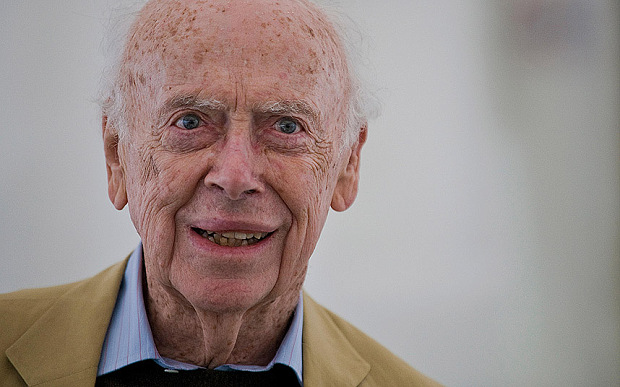
James Watson won the Nobel Prize in 1962 along with Francis Crick for discovering the double helix structure of DNA.
New York Times, 1 Jan 2019:
“James Watson Won’t Stop Talking About Race”
The Nobel-winning biologist has drawn global criticism with unfounded pronouncements on genetics, race and intelligence. He still thinks he’s right, a new documentary finds.
“Decoding Watson,” a new film about Dr. James D. Watson explores the gulf between his scientific brilliance and his views on race.
It has been more than a decade since James D. Watson, a founder of modern genetics, landed in a kind of professional exile by suggesting that black people are intrinsically less intelligent than whites.
In 2007, Dr. Watson, who shared a 1962 Nobel Prize for describing the double-helix structure of DNA, told a British journalist that he was “inherently gloomy about the prospect of Africa” because “all our social policies are based on the fact that their intelligence is the same as ours, whereas all the testing says, not really.”
Moreover, he added, although he wished everyone were equal, “people who have to deal with black employees find this not true.” Dr. Watson’s comments reverberated around the world, and he was forced to retire from his job as chancellor of the Cold Spring Harbor Laboratory on Long Island, although he retains an office there.
He apologized publicly and “unreservedly,’’ and in later interviews he sometimes suggested that he had been playing the provocateur — his trademark role — or had not understood that his comments would be made public.
Ever since, Dr. Watson, 90, has been largely absent from the public eye. His speaking invitations evaporated. In 2014, he became the first living Nobelist to sell his medal, citing a depleted income from having been designated a “nonperson.’’
But his remarks have lingered. They have been invoked to support white supremacist views, and scientists routinely excoriate Dr. Watson when his name surfaces on social media.
Eric Lander, the director of the Broad Institute of M.I.T. and Harvard, elicited an outcry last spring with a toast he made to Dr. Watson’s involvement in the early days of the Human Genome Project. Dr. Lander quickly apologized.
“I reject his views as despicable,” Dr. Lander wrote to Broad scientists. “They have no place in science, which must welcome everyone. I was wrong to toast, and I’m sorry.’’
And yet, offered the chance recently to recast a tarnished legacy, Dr. Watson has chosen to reaffirm it, this time on camera. In a new documentary, “American Masters: Decoding Watson,’’ to be broadcast on P.B.S. on Wednesday night, he is asked whether his views about the relationship between race and intelligence have changed.
“No,’’ Dr. Watson said. “Not at all. I would like for them to have changed, that there be new knowledge that says that your nurture is much more important than nature. But I haven’t seen any knowledge. And there’s a difference on the average between blacks and whites on I.Q. tests. I would say the difference is, it’s genetic.’’
Dr. Watson adds that he takes no pleasure in “the difference between blacks and whites’’ and wishes it didn’t exist. “It’s awful, just like it’s awful for schizophrenics,’’ he says. (His son Rufus was diagnosed in his teens with schizophrenia.) Dr. Watson continues: “If the difference exists, we have to ask ourselves, how can we try and make it better?”
[...]
“There are powerful methods for studying the genetic and environmental origins of individual differences, but not for studying the causes of average differences between groups,” Dr. Plomin he writes in an afterword to be published this spring in the paperback edition of his book, “Blueprint: How DNA Makes Us Who We Are.”
Whether Dr. Watson was aware of any of this science is unclear. In the film, he appears to have grown increasingly isolated. He mentions missing Francis Crick, his collaborator in the race to decipher the structure of DNA.
“We liked each other,’’ Dr. Watson says of Dr. Crick. “I couldn’t get enough of him.’’
As history now knows, the duo was able to solve the puzzle in 1953, with their hallmark models of cardboard and metal only with the help of another scientist, Rosalind Franklin, whose X-ray photograph of the DNA molecule was shown to Dr. Watson without her permission.
The tools of molecular biology unlocked by their discovery have since been used to trace humanity’s prehistory, devise lifesaving therapies, and develop Crispr, a gene-editing technology that was used recently, and unethically, to alter the DNA of twin human embryos.
And Dr. Watson became perhaps the most influential biologist of the second half of the 20th century. His textbook, “Molecular Biology of the Gene,’’ helped define the new field. First in a laboratory at Harvard and then at Cold Spring Harbor, he trained a new generation of molecular biologists and used his star power to champion such projects as the first sequencing of the human genome.
“You knew when you heard him that you were at the start of a revolution in understanding,’’ Nancy Hopkins, a biologist at the Massachusetts Institute of Technology who studied with Dr. Watson in the 1960s, says in “Decoding Watson.’’
“You felt as if you were part of this tiny group of people who had seen the light.’’
Complete story at New York Times
